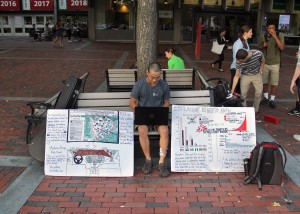
In light of Ebola scares such as the one in Boston over the Columbus Day weekend, Boston University student Jacob Yu is raising awareness about the need for more adequate mapping of the disease.
Yu, a sophomore in the College of Arts and Sciences, stationed himself at the George Sherman Union during the past week with a poster reading: “Ebola: What You Need to Know.”
The poster says Yu is “skipping all [of his] classes except labs until all of the affected area is adequately mapped, and you should too. There are things more important in life than your GPA, like saving innocent people’s lives.”
“The whole point is because the hospitals are over capacity, people who have Ebola are getting sent back to their communities,” he said. “They’re trying to find these people and quarantine them.”
As of Wednesday, there have been 8,997 cases of Ebola in West Africa, 4,493 of which have resulted in death. In the United States, there has been one death and 118 cases of exposure, according to the Centers for Disease Control and Prevention.
Through the use of mapping projects such as the Humanitarian OpenStreetMap Team, anyone can create an account and use satellite images to map data in areas and even distinct households where Ebola is prevalent, Yu said.
“All you have to do is click load. It’s like dragging something in Paint,” he said. “It’s like swiping something. If you swipe something into a house, then it goes into a house. The point being, it’s super easy. It’s a concrete way you can help instead of just giving money.”
Although he is currently alone in his efforts at BU, Yu said sharing the information with other students is a step toward having a greater impact.
“It’s not really a protest. It’s more raising awareness,” he said. “I convinced at least like 12 people during this time, like, ‘Hey, Google this,’ and they said they’d go home and Google it because that’s all it takes.”
Frank Feeley, a professor in the School of Public Health, said the lack of ample health facilities is always a large concern in any developing world epidemic.
“The big issues are properly isolating and treating cases as they’re identified,” he said. “Having large enough facilities to do that that are well managed and easy to keep clean.”
Feeley said Liberia and Sierra Leone’s tumultuous pasts and weak health systems have made it difficult to properly combat the Ebola outbreak.
“One of the big issues that I’m not sure everybody is fully aware of in Liberia and Sierra Leone is that they had weak health care systems to begin with, and then they had horrendous civil wars that only ended 10 years ago with large numbers of already-scarce health personnel emigrating,” he said.
Students at BU cannot alter the histories of Liberia and Sierra Leone, but they can help deal with the outcomes of them, Yu said.
“There are 700 people across the world who are actually editing this map,” he said. “Since we’ve started, as a team, these 700 people have gotten more than half of the infected area mapped.”
Several students in Boston said they are not concerned about the issue and convinced of its urgency.
Sofya Simakova, a freshman in CAS, said Ebola might be receiving too much attention.
“Maybe people talk about it more than it’s worth,” she said. “Maybe the reaction is too much. I don’t know exactly what we can do as students. Maybe it’s more a professional business. I don’t know, we could start a charity and get money to help promote health in Africa.”
Israel Shaw, a senior at Wentworth Institute of Technology, said he has trouble believing in the urgency of the outbreak in the United States.
“People are making a really big deal out of it,” he said. “I don’t know how much I should trust that it’s a big deal or not. Because I know in the past there’s been the bird flu, there was the swine flu, there’s a lot of stuff like that, that they made a really big deal about, and then a few people got sick, and nothing really happened with it. So I don’t know if this is going to be a similar thing.”




